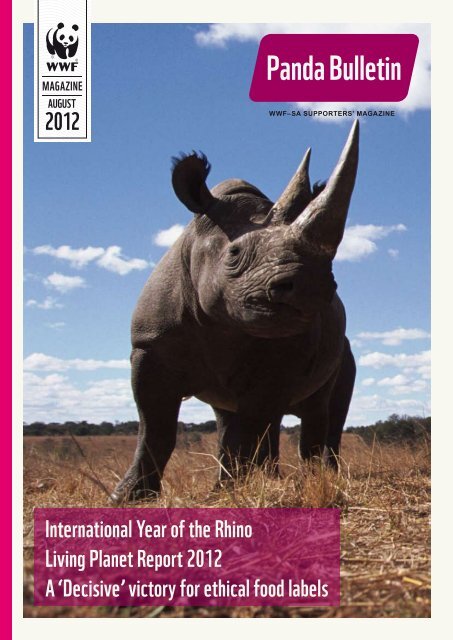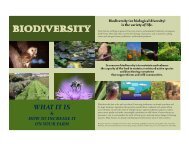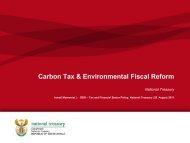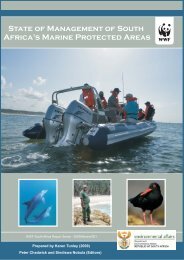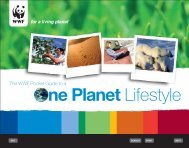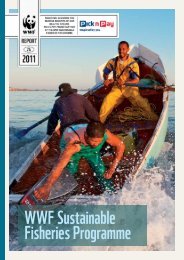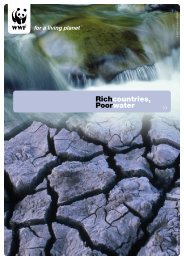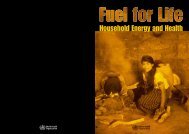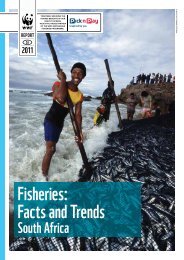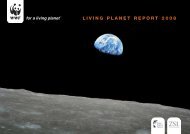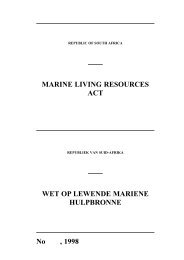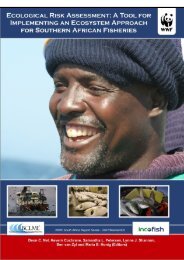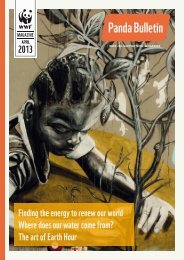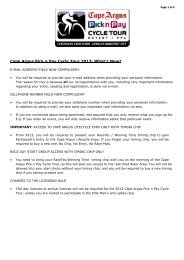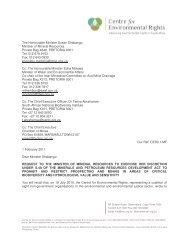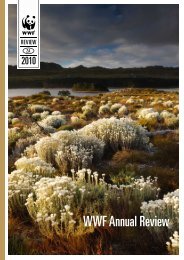Living Planet Report - WWF South Africa
Living Planet Report - WWF South Africa
Living Planet Report - WWF South Africa
Create successful ePaper yourself
Turn your PDF publications into a flip-book with our unique Google optimized e-Paper software.
MAGAZINE<br />
AUGUST<br />
International Year of the Rhino<br />
<strong>Living</strong> <strong>Planet</strong> <strong>Report</strong> 2012<br />
A ‘Decisive’ victory for ethical food labels<br />
Panda bulletin<br />
<strong>WWF</strong>–SA SupporterS’ MAgAzine
CONTENTS<br />
<strong>WWF</strong> news:<br />
More than two planets needed by 2030 3<br />
<strong>WWF</strong> conservation news:<br />
<strong>WWF</strong>, Sanlam scoop awards, I&J signs landmark<br />
agreement with <strong>WWF</strong>-SASSI, and Nedbank commits<br />
to boosting <strong>WWF</strong>’s Sustainable Agriculture efforts 4<br />
<strong>WWF</strong> sustainable business news:<br />
A ‘Decisive’ victory for ethical food labels 5<br />
<strong>WWF</strong> fundraising and business news:<br />
Pedal for the planet and buy bags to save our rhinos 6<br />
<strong>WWF</strong> issue:<br />
International Year of the Rhino 8<br />
<strong>WWF</strong> issue:<br />
<strong>Living</strong> <strong>Planet</strong> <strong>Report</strong> 2012 9<br />
<strong>WWF</strong> issue:<br />
Catalysing change – from catchment to coast 12<br />
<strong>WWF</strong> issue:<br />
The Food‑Water‑Energy Nexus 13<br />
<strong>WWF</strong> kids<br />
Entertainment for young pandas 14<br />
PANDA BULLETIN TEAM<br />
Editor: Eitan Prince<br />
Editorial team: Jorisna Bonthuys, Quathar Jacobs,<br />
Sindiswa Nobula, Pam Sherriffs, Laura Tyrer<br />
Graphic design: Jenny Frost<br />
Cover photo: John Downer/naturepl.com<br />
The Panda Bulletin is printed on Reviva Plus, a 100%<br />
recycled paper.<br />
Published in August 2012 by <strong>WWF</strong> (World Wide Fund for Nature),<br />
Cape Town, <strong>South</strong> <strong>Africa</strong>. Any reproduction in full or in part must<br />
mention the title and credit the above-mentioned publisher as the<br />
copyright owner.<br />
© Text 2012 <strong>WWF</strong>-SA. All rights reserved.<br />
Panda Bulletin April 2012 – Page 2<br />
© <strong>WWF</strong>-SA<br />
From the CEO’s desk<br />
When <strong>WWF</strong> was established, much of its attention was focused<br />
on wildlife conservation. Although the organisation has, in recent<br />
years, expanded its focus to conserving the environment as a whole,<br />
<strong>WWF</strong>‑<strong>South</strong> <strong>Africa</strong> continues its work in the fields of plant and<br />
animal species conservation. Within this sphere of <strong>WWF</strong>’s work, the<br />
rhino remains a critical species for conservation.<br />
I am therefore encouraged by the announcement that June 2012<br />
marked the start of the International Year of the Rhino. Internationally<br />
and here in <strong>South</strong> <strong>Africa</strong>, <strong>WWF</strong> invests an incredible amount of time<br />
and resources into the protection of our iconic rhino. We are starting<br />
to see results in this area of our work, but the reality is that rhino<br />
work is complex and requires long-term planning. We trust that this<br />
special attention on rhinos will spur even more of our supporters into<br />
action to save the species. You will find detailed coverage of rhino<br />
matters on the centre page of this Panda Bulletin.<br />
It is also a pleasure to spotlight newer initiatives in <strong>WWF</strong>’s work in<br />
this issue. Food, water and energy security is fundamental to our social<br />
and economic development. The dynamic interactions between these<br />
three basic necessities are now more evident than at any other time<br />
in our history, which has prompted <strong>WWF</strong> to work more vigorously in<br />
this field. In this issue (see page 13) we have illustrated how these three<br />
areas, which are so profoundly connected, impact on one another and<br />
should ultimately inspire all of us to strive to live more sustainably.<br />
On the issue of sustainability, <strong>WWF</strong>’s Sustainable Business team<br />
has conceptualised a new forum for public discussion on topical<br />
environmental issues called ‘DecisiveDebates’, hosted in partnership<br />
with public radio channel SAfm (104 – 107fm). The pilot debate in<br />
this series was held in May, featuring opposing sides packed with<br />
compelling speakers who tackled the topic of ethical food labelling.<br />
The main arguments are covered in this issue, and I am eager to hear<br />
the next instalment.<br />
As always <strong>WWF</strong> is grateful for the support it receives from individuals<br />
and corporates alike. We have been working hard to interact more<br />
closely with you, especially around participatory events such as the<br />
Cape Argus Pick n Pay Cycle Tour in March. The Momentum 94.7<br />
Cycle Challenge will be taking place in November, and I encourage<br />
you to join our Panda Peloton (details on page 6) and ride for nature.<br />
The Chair of our Board, Valli Moosa, and I shall also be there.<br />
For a <strong>Living</strong> <strong>Planet</strong>,
© WMiCHel GuNTHer / <strong>WWF</strong>-CANoN <strong>WWF</strong>-SASSI<br />
MORE ThAN TWO PLANETS NEEDED bY 2030<br />
An ever-growing demand for resources by<br />
a growing population is putting tremendous<br />
pressures on our planet’s biodiversity and is<br />
threatening <strong>South</strong> <strong>Africa</strong>’s future security,<br />
health and well-being. That’s according to<br />
the 2012 edition of <strong>WWF</strong>’s <strong>Living</strong> <strong>Planet</strong><br />
<strong>Report</strong> (LPR) – the leading biennial survey<br />
of the Earth’s health.<br />
“We are living as if we have an extra planet<br />
at our disposal. We are using 50% more<br />
resources than the Earth can sustainably<br />
produce and unless we change course, that<br />
number will grow fast – by 2030 even two<br />
planets will not be enough,” said Dr Morné<br />
du Plessis, CEO of <strong>WWF</strong>-SA.<br />
A full interview with Dr Du Plessis<br />
on the <strong>Living</strong> <strong>Planet</strong> <strong>Report</strong><br />
can be found on page 10 of this<br />
Panda Bulletin.<br />
The loss of ecosystems services is a serious threat to the future well-being and development of all people.<br />
2012 marks the start of the International Year of the Rhino<br />
Increasing alarm for the fate of the two rarest<br />
rhinoceros species, and growing concern<br />
over the increased illegal hunting of rhinos<br />
and demand for rhino horn affecting all<br />
five species, has prompted President Susilo<br />
Bambang Yudhoyono of Indonesia to declare<br />
5 June 2012 as the start of the International<br />
Year of the Rhino. President Yudhoyono took<br />
this step at the request of the International<br />
Union for Conservation of Nature (IUCN)<br />
and other conservation organisations,<br />
because the future survival of both the Javan<br />
and Sumatran rhinos depends on effective<br />
conservation action in Indonesia.<br />
The government of Indonesia has also made<br />
commitments to establish a high-level rhino<br />
team takes to the ‘pavement’<br />
The <strong>WWF</strong> <strong>South</strong>ern <strong>Africa</strong>n Sustainable<br />
Seafood Initiative team made good on their<br />
word when they hosted a ‘pavement’ concert<br />
at the V&A Waterfront’s Harbour House in<br />
Cape Town. This successful showcase was<br />
the result of their commitment to this year’s<br />
I Will If You Will Earth Hour campaign<br />
challenge. The team challenged consumers<br />
to host a sustainable seafood dinner by<br />
candlelight for Earth Hour and in turn they<br />
would perform to those who pledged their<br />
support for the annual global campaign.<br />
The SASSI team’s Alice Johnson took on<br />
the role of MC as she welcomed guests<br />
and introduced the line-up. This included<br />
performances by Janine Basson and her<br />
band, Wisaal Osman’s belly-dancing and<br />
<strong>WWF</strong>’s beloved pandas in a narrated skit<br />
entitled ‘Eats, Shoots and Leaves’.<br />
task force of national and international<br />
experts; allocate sufficient resources to<br />
enforce protection of remaining rhino<br />
populations, and ensure that there is regular<br />
and intensive monitoring of all rhino<br />
populations in Indonesia.<br />
During this International Year of the Rhino,<br />
it is hoped that all rhino range states in<br />
<strong>Africa</strong> and Asia will join Indonesia and give<br />
priority to securing their rhino populations.<br />
On pages 8 and 9 you can find<br />
more detailed coverage of<br />
International Year of the Rhino as<br />
well as reports on <strong>WWF</strong>’s efforts<br />
to save the rhino.<br />
Janine Basson belts out a tune at the Harbour House<br />
in Cape Town.<br />
Panda Bulletin August 2012 – Page 3<br />
© NASA © <strong>WWF</strong>-SA
©THoMAS P. PeSCHAk<br />
CONSERvATION NEWS<br />
<strong>WWF</strong> and Sanlam water scoop<br />
Greening the Future awards<br />
Sanlam and <strong>WWF</strong> have won two of the<br />
Mail & Guardian’s Greening the Future<br />
Awards in recognition of the partnership’s<br />
freshwater work. The annual awards<br />
recognise and celebrate individuals and<br />
organisations that have contributed greatly<br />
to environmental sustainability. A first time<br />
entrant to the Awards, Sanlam and <strong>WWF</strong><br />
won the second award in the Water Care<br />
and Management category.<br />
Sanlam and <strong>WWF</strong> also became the first<br />
winners of the inaugural Sudley Adams<br />
Memorial Award. This Award was introduced<br />
in honour of Sudley Adams, the Mail &<br />
Guardian’s Brand Manager and Convenor of<br />
the awards for the past decade who passed<br />
away in May 2012. According to the M&G,<br />
the judges considered all the entries for this<br />
special Award and decided the one that best<br />
embodied Sudley’s forward-thinking vision<br />
and team spirit was the <strong>WWF</strong> Sanlam <strong>Living</strong><br />
Waters Partnership.<br />
Fiona Macleod, editor of the M&G<br />
Greening the Future supplement, said<br />
the partnership was an exemplary model<br />
for other conservation initiatives. “Sanlam’s<br />
continued support for <strong>WWF</strong>-SA’s water<br />
programmes has been endorsed through the<br />
buy-in of other companies. The partnership<br />
presents win-win solutions for some of<br />
<strong>South</strong> <strong>Africa</strong>’s most pressing natural<br />
resources problems, and as such is a<br />
deserving winner of Greening the Future’s<br />
two top awards.”<br />
For more on the <strong>WWF</strong> and Sanlam<br />
partnership, see page 12.<br />
Panda Bulletin August 2012 – Page 4<br />
ronald Fasol and Morné du Plessis<br />
I&J signs landmark<br />
agreement with <strong>WWF</strong>-SASSI<br />
<strong>WWF</strong>-<strong>South</strong> <strong>Africa</strong> has welcomed an<br />
announcement made by I&J, stating it is<br />
committed to transforming its seafood<br />
operations to meet strict sustainability<br />
standards by the end of 2015.<br />
I&J, a leading <strong>South</strong> <strong>Africa</strong>n fishing<br />
company, has demonstrated its commitment<br />
to the environment by signing a participation<br />
agreement with the <strong>WWF</strong>-SA <strong>South</strong>ern<br />
<strong>Africa</strong>n Sustainable Seafood Initiative<br />
(<strong>WWF</strong>‑SASSI). This further enhances I&J’s<br />
long history of responsible fishing where<br />
it has provided clear leadership through,<br />
amongst others, its commitment to the<br />
Marine Stewardship Council (MSC), its active<br />
role in the Responsible Fisheries Alliance<br />
(RFA) and its continued support of the<br />
responsible fisheries training programme.<br />
“We congratulate I&J for leading the way<br />
in setting these tangible conservation goals<br />
for the fishing sector,” said <strong>WWF</strong>‑SA CEO<br />
Morné du Plessis.<br />
Nedbank commits to<br />
boosting <strong>WWF</strong>’s Sustainable<br />
Agriculture efforts<br />
Nedbank has signed a three-year partnership<br />
agreement with <strong>WWF</strong> in support of the<br />
organisation’s newly established Sustainable<br />
Agriculture Programme.<br />
The <strong>WWF</strong> Sustainable Agriculture Programme<br />
strives to ensure healthy ecosystems are<br />
secured and maintained within our farmlands<br />
and broader catchments, whilst promoting<br />
and supporting the development of a viable<br />
and resilient agribusiness sector.<br />
This partnership will assist <strong>WWF</strong>-<strong>South</strong> <strong>Africa</strong><br />
in leveraging the <strong>South</strong> <strong>Africa</strong>n agricultural<br />
sector’s role and contribution to securing and<br />
restoring key priority areas of conservation<br />
importance whilst also promoting sustainable<br />
production practices which reduce the sector’s<br />
overall environmental footprint and minimise<br />
the impacts of production activities on the<br />
finite natural resources.<br />
Making sustainability<br />
about people<br />
Together with Nedbank, <strong>WWF</strong> recently<br />
provided three rural communities in<br />
Mpumalanga with Hippo Rollers. The 50<br />
Hippo Rollers, which were kindly provided<br />
by Nedbank, help ease the collection and<br />
transportation of water. These communities<br />
form part of <strong>WWF</strong>’s Biodiversity<br />
Stewardship and Land Reform Programme<br />
which aims to empower local communities<br />
in biodiversity rich areas to better manage<br />
their land for long-term sustainability. This<br />
donation forms part of the group’s water<br />
stewardship journey which, amongst other<br />
interventions, includes their participation in<br />
our Water Balance Programme.<br />
© <strong>WWF</strong>-SA © GreeN reNAiSSANCe
SUSTAINAbLE bUSINESS NEWS<br />
A ‘Decisive’ victory for ethical food labels<br />
<strong>South</strong> <strong>Africa</strong>n consumers are increasingly required to make food<br />
choices based not just on price or quality but also on the environmental<br />
or social ethos, the apparent ethics, of a particular brand.<br />
Organic, Fairtrade, Forest Stewardship<br />
Council, Marine Stewardship Council,<br />
Farming for the Future, Utz, Free Range …<br />
suddenly the <strong>South</strong> <strong>Africa</strong>n marketplace is<br />
seeing a proliferation of ethical labels on<br />
products. This begs the questions: Is this a<br />
good thing? Who is benefiting from these<br />
labels? And should the consumer trust and<br />
support them?<br />
A group of experts faced off on whether<br />
labelling products as green or socially<br />
sound really does make a difference in<br />
addressing the challenge of ensuring<br />
equity in pro‑poor benefits and measurably<br />
reduced environmental impact.<br />
Final Vote: 74% for the motion We<br />
Need Ethical Food Labels<br />
POINTS FOR POINTS AGAINST<br />
Labels, such a Fairtrade, have made<br />
a significant difference in the lives of<br />
producers (farmers) and consumers<br />
- Producers are active co-owners of the<br />
Fairtrade system and therefore help<br />
shape (and tailor) the system to meet<br />
their needs.<br />
They empower the consumer to make<br />
good choices<br />
They add something that retailers<br />
cannot do themselves<br />
- Credible third-party certification<br />
- Valid means of avoiding greenwashing<br />
- Certification may be costly but that<br />
extra effort to prove claims must be<br />
verified (and that implies expenses).<br />
Like any other audit, it is necessary<br />
DEBATERS FOR ThE MOTION<br />
- Noel Oettle, Environmental<br />
Management Group, previous Chair<br />
of Fairtrade <strong>South</strong> <strong>Africa</strong> and board<br />
member of Fairtrade <strong>Africa</strong><br />
- Tom McLaughlin, Woolworths<br />
Environment Manager<br />
- Jonathan Robinson, the founder and<br />
owner of Bean There Coffee Company,<br />
This type of labelling is not practical<br />
and is not economically sensible<br />
- “Pennies to the poor”<br />
- Too much money goes to certification<br />
bodies and not to producers directly<br />
- Labels do not address food security,<br />
which is one of the main challenges in<br />
the continent<br />
Producers are getting closed out<br />
because they cannot get the label<br />
- It’s the “law of unintended consequences”:<br />
It reinforces the inequalities that they are<br />
trying to change<br />
We have legislation, the Consumer<br />
Protection Act, which does this for us<br />
Great companies wear their ethics,<br />
their brand, on their sleeves<br />
- You need more than a sticky label.<br />
Brand confidence is more important<br />
than a stamp on the product<br />
AGAINST ThE MOTION<br />
- Prof Umezuruike Linus Opara,<br />
Stellenbosch University<br />
- David Donde is founder and owner of<br />
Truth CoffeeCult<br />
- Jonathan Cherry is the founder of<br />
Cherryflava Media<br />
The <strong>WWF</strong> and SAfm DecisiveDebates<br />
series is taking public debate to an<br />
exciting new level. The movement is<br />
aimed at advancing the conversation<br />
around the most pressing sustainability<br />
issues facing <strong>South</strong> <strong>Africa</strong>ns, to help<br />
us think about how we live our lives in<br />
a way that is responsible, ethical and<br />
environmentally sound.<br />
oftentimes the solution to deeply<br />
contentious issues lies simply in<br />
‘reframing’ the conversation. This<br />
is exactly what the <strong>WWF</strong> and SAfm<br />
DecisiveDebates series does – provide<br />
an opportunity for the public to directly<br />
engage with dynamic, outspoken experts<br />
as they tackle a range of hot topics.<br />
in the series, each debating team has<br />
three chances to persuade the audience<br />
through opening, rebuttal and closing<br />
arguments. The audience participates<br />
by asking questions from the floor and<br />
exercising the power of the vote at the<br />
beginning and end of the debate in<br />
determining the stronger side. The winning<br />
team is the one that gets the audience on<br />
its side, swaying the votes and achieving<br />
the greatest margin of change between<br />
the first and last votes.<br />
The next <strong>WWF</strong> & SAfm<br />
DecisiveDebate will be held on<br />
5 September and the motion is,<br />
“Say no to legalised rhino horn<br />
trade.” If you are interested in<br />
participating, contact<br />
sslamong@wwf.org.za.<br />
More details will be posted at<br />
www.wwf.org.za.<br />
Moderator Xolani Gwala, of SAfm, shares a lighter<br />
moment with the DecisiveDebates contestants<br />
and audience.<br />
Panda Bulletin August 2012 – Page 5<br />
© NAWAAl DeANe
FUNDRAISING<br />
Ride for a purpose… ride for nature<br />
Following successful participation in the<br />
Cape Argus Pick n Pay Cycle Tour, with more<br />
than 160 riders, <strong>WWF</strong> is entering a Panda<br />
Peloton in this year’s Momentum 94.7 Cycle<br />
Challenge. <strong>WWF</strong> supporters – whether<br />
serious cyclists or keen beginners – are<br />
invited to pedal for the planet.<br />
Participation in the Panda Peloton is open<br />
to both individuals and corporate teams.<br />
Being a part of the peloton secures riders an<br />
early start time (between 08h15 and 08h35).<br />
Riders also get to cycle in a <strong>WWF</strong> cycling<br />
shirt. Most importantly, participating<br />
cyclists will raise awareness and funds<br />
for <strong>WWF</strong>’s vital conservation work in<br />
<strong>South</strong> <strong>Africa</strong>.<br />
A treat for <strong>WWF</strong>’s top donors<br />
Panda Bulletin August 2012 – Page 6<br />
Enter either the Individual Challenge or<br />
Corporate Challenge. The closing date for<br />
official Momentum 94.7 Cycle Challenge<br />
entries is 30 September 2012.<br />
For more information, visit:<br />
www.wwf.org.za/cyclechallenge.<br />
A group of 29 of <strong>WWF</strong>’s high-level donors were treated to a tour of the Waterkloof Winery,<br />
a champion member of <strong>WWF</strong>’s Biodiversity and Wine Initiative (<strong>WWF</strong>‑BWI). The outing<br />
allowed donors to witness this biodynamic winery at work and also enjoy a cellar tour and<br />
lunch at the estate restaurant. The purpose of the outing was to reward donors for their vital<br />
contributions to the important conservation work <strong>WWF</strong> has been doing and continues to do.<br />
During the tour, Martin Albertus of <strong>WWF</strong>-BWI explained to donors that 95% of <strong>South</strong><br />
<strong>Africa</strong>’s viticulture takes place within the Cape Floral Kingdom (CFK), one of the<br />
smallest and richest biodiversity areas in the world. Many species in the CFK, though,<br />
are under threat as a result of agriculture and urbanisation. However, through the work<br />
of BWI, 126 000 hectares of privately‑owned land have over five years been set aside for<br />
conservation. This area exceeds the total area of land under vine, which is 120 000ha –<br />
a conservation gain worth celebrating!<br />
Save <strong>Africa</strong>’s rhinos with <strong>WWF</strong> and Carrol boyes<br />
Carrol Boyes, the renowned <strong>South</strong> <strong>Africa</strong>n<br />
artist and designer, is selling this rhinothemed<br />
business card stand, and will donate<br />
25% of the proceeds of the product to <strong>WWF</strong><br />
and its rhino conservation work.<br />
Boyes’s designs are famous for drawing their<br />
inspiration from the beauty of nature. And<br />
these rhino business card stands, which<br />
have been skilfully crafted, will show your<br />
commitment to living in harmony with<br />
nature while making a contribution to<br />
helping keep <strong>Africa</strong>’s iconic rhino alive.<br />
bag it!<br />
Ditch the plastic and buy<br />
bags that make a difference<br />
to our environment!<br />
The fabulous cotton bag above is made for<br />
Pick n Pay by Township, a Fairtrade supplier<br />
that has created employment for more than<br />
75 township women. The bag retails at<br />
R49.99 and R5.00 of this price goes to the<br />
<strong>WWF</strong>. Pick n Pay is working with <strong>WWF</strong>’s<br />
<strong>South</strong>ern <strong>Africa</strong>n Sustainable Seafood<br />
Initiative (<strong>WWF</strong>‑SASSI) to transform all its<br />
fresh, frozen and canned seafood operations<br />
by 2015.<br />
The beautifully designed bags support the<br />
sustainable seafood campaign.<br />
Woolworths has launched a new bag in its<br />
‘Limited Edition’ series (see below), this<br />
time supporting rhino conservation. These<br />
strikingly designed bags are on sale in<br />
participating stores countrywide. R10 from<br />
every purchase goes directly to the Wildlife<br />
Act Fund and <strong>WWF</strong>-<strong>South</strong> <strong>Africa</strong>’s Black<br />
Rhino Range Expansion Project, which<br />
helps to grow and protect rhino populations.<br />
You also stand the chance to win a luxury<br />
safari to &Beyond’s Phinda Private Game<br />
Reserve for two people<br />
for four nights.<br />
It also includes<br />
a chance to track<br />
a rhino with a<br />
specialist guide.<br />
Get your rhino<br />
bag today, show<br />
your support and<br />
help <strong>WWF</strong> save<br />
our iconic rhinos.
USINESS NEWS<br />
Membership/Project funding<br />
Thank you to all our Corporate Members who have renewed their<br />
support through their corporate memberships.<br />
New members<br />
principAl MeMber: ebm-papst <strong>South</strong> <strong>Africa</strong> (Pty) ltd<br />
Senior MeMber: Accenture (<strong>South</strong> <strong>Africa</strong>) (Pty) ltd<br />
MeMberS: Competitive Capabilities<br />
international (Pty) ltd<br />
leisure Group<br />
Pasdec Automotive Technologies<br />
WorleyParsons rSA (Pty) ltd<br />
Project funding<br />
HSbc <strong>WWF</strong> rhino Conservation work<br />
KonicA MinoltA <strong>WWF</strong> rhino Conservation work<br />
rAMSAy & Son<br />
(Getaway MAgAzine)<br />
Donation-in-kind<br />
GET INvOLvED<br />
Become a Corporate Member today!<br />
Cape Town Members<br />
Contact Virginia Styer on 021 657 6600 or<br />
vstyer@wwf.org.za<br />
<strong>WWF</strong> rhino Conservation work<br />
Thank you to HSBC for catering and hosting <strong>WWF</strong>’s Corporate<br />
breakfast in Johannesburg.<br />
Thank you to The Vineyard Hotel & Spa, Newlands, for hosting<br />
<strong>WWF</strong>’s Corporate breakfast in Cape Town.<br />
Thank you to Q Distribution, the sole distributors of Vidyo HD<br />
Conferencing, for its donation of a Vidyo Conference Server,<br />
valued at approximately r132 000. Vidyo will host the server<br />
in its data centre and will also be donating the monthly cost of<br />
hosting the server as well as the bandwidth the server uses up<br />
to a specific monthly amount.<br />
Johannesburg Members<br />
Contact Puleng Mosholi on 011 447 1213 or<br />
pmosholi@wwf.org.za<br />
For more information, visit www.wwf.org.za/act_now.<br />
Pick n Pay Smart Shoppers:<br />
Donate now!<br />
<strong>WWF</strong> has been chosen as one of 6<br />
charity organisations to benefit from<br />
the Pick n Pay Smart Shopper Initiative.<br />
Smart shoppers can now donate their<br />
points to <strong>WWF</strong> at one of 880 in-store kiosks countrywide.<br />
www.picknpay.co.za<br />
Change the way you buy Airtime for yourself, your company,<br />
your family or anyone else, and make a contribution to <strong>WWF</strong>’s<br />
conservation work at the same time.<br />
www.airtime4good.co.za.<br />
Apply for a<br />
My<strong>Planet</strong> card<br />
Every time you swipe your<br />
My<strong>Planet</strong> card at specific stores<br />
a percentage of your purchase is donated to <strong>WWF</strong> <strong>South</strong> <strong>Africa</strong>.<br />
Choose <strong>WWF</strong> as the charity you want to support.<br />
www.myschool.co.za<br />
The Head of <strong>WWF</strong>’s Business Development & Fundraising unit, Dr Andrew<br />
Baxter, left, and Virginia Styer, <strong>WWF</strong> Corporate Membership Co-ordinator,<br />
right, thank Craig Watson, the MD of Q Distribution, for the donation of state of<br />
the art video conferencing facilities to <strong>WWF</strong>-SA.<br />
Panda Bulletin August 2012 – Page 7<br />
© <strong>WWF</strong>-SA
© <strong>WWF</strong>-SA<br />
INTERNATIONAL YEAR OF ThE RhINO<br />
2012 marks the start of the International Year of the Rhino as declared by<br />
Indonesian President Susilo Bambang Yudhoyono in June. His decision follows a<br />
request by several conservation organisations, including the International Union<br />
for Conservation of Nature (IUCN), because the future survival of both the Javan<br />
and Sumatran rhinos depends on effective conservation action in Indonesia.<br />
The announcement has resonated here in <strong>Africa</strong>, where the scourge of poaching<br />
continues to threaten our rhino populations.<br />
“This comes at a time when rhinos, once<br />
again, face a real threat of potential decline<br />
and the need to rally international support<br />
to reverse the current trends must be<br />
prioritised,” says Dr Joseph Okori, the head<br />
of <strong>WWF</strong>’s <strong>Africa</strong>n Rhino Programme (ARP).<br />
Okori has highlighted the following trends<br />
in the poaching scourge that is threatening<br />
rhinos on the continent:<br />
• <strong>South</strong> <strong>Africa</strong> lost 1.61% of its rhino<br />
population by the end of 2010; during the<br />
same period Kenya lost 2.29%, Namibia<br />
0.09% and Zimbabwe 6.24%.<br />
• The loss of 333 rhino in <strong>South</strong> <strong>Africa</strong> in<br />
2010 represents a poaching level 2.73<br />
times greater than 2009.<br />
• If this trend were to continue for two years,<br />
the annual number of rhino poached in<br />
<strong>South</strong> <strong>Africa</strong> would increase to 12.0%.<br />
• For rhino populations to remain sustainable<br />
they need to increase by 5.0% per year.<br />
• Currently, white rhino populations are<br />
breeding at 7.2%, while black rhino<br />
populations are at 4.9%.<br />
“There is absolutely no room for<br />
complacency, despite the overall continual<br />
increase of rhino numbers across the<br />
A young black rhino calf is caught on a camera trap<br />
peeping out from behind its mother.<br />
Panda Bulletin August 2012 – Page 8<br />
continent,” Okori adds. “The escalation of<br />
poaching in recent years needs a great deal<br />
of effort from all concerned and affected<br />
parties to bring it under control. It threatens<br />
to unravel the good work achieved by many<br />
to increase our rhino numbers.”<br />
Meanwhile, <strong>WWF</strong>-SA’s CEO, Dr Morné du<br />
Plessis says, “The loss of rhino populations<br />
in <strong>South</strong> <strong>Africa</strong> would have a direct impact<br />
on the rest of the continent as we remain the<br />
donor basket for <strong>Africa</strong>n rhino.” He adds,<br />
“<strong>South</strong> <strong>Africa</strong>’s success is <strong>Africa</strong>’s pride.<br />
Therefore governments across the continent<br />
and Asia must work together across borders<br />
to stop the illegal trade.”<br />
Rhino poaching is being conducted by<br />
sophisticated international criminal<br />
syndicates that smuggle the poached horns<br />
to Asia. For this reason, Du Plessis feels, the<br />
battle against rhino poaching will be won in<br />
Asia, not <strong>Africa</strong>.<br />
Fighting rhino poaching in<br />
the courts<br />
In an effort to help prosecute and convict<br />
suspected rhino poachers, <strong>WWF</strong> supports and<br />
funds the work of the wildlife trade monitoring<br />
network, TRAFFIC. The <strong>South</strong> <strong>Africa</strong>n<br />
New calves born to black<br />
rhino population<br />
Good news for rhino populations:<br />
The Pongola Game reserve, a partner site<br />
of the Black rhino range expansion Project<br />
(BrreP), recently spotted two new rhino<br />
calves. one was sighted by monitors, the<br />
other showed up in a picture taken from a<br />
camera trap. The calves’ gender has not yet<br />
been established.<br />
BrreP aims to increase numbers and<br />
growth rate of the critically endangered<br />
judiciary has an Environmental Management<br />
Inspectors (EMI) course, which<br />
has been made mandatory<br />
for prosecutors and<br />
magistrates.<br />
rhino horn is made of keratin, the same<br />
substance as hair and human fingernails.<br />
The increase in demand for rhino horn has<br />
been driven by demand in Asia, where it’s<br />
believed it can cure cancer.<br />
Poaching in <strong>Africa</strong> has<br />
increased since 2007 when<br />
syndicates started using high-<br />
powered rifles, helicopters,<br />
night vision equipment and<br />
veterinary tranquilizers.<br />
black rhino. it does this through facilitating<br />
partnerships between landowners with good<br />
black rhino habitat. Since the project began<br />
in 2003, seven new black rhino populations<br />
have been created in <strong>South</strong> <strong>Africa</strong> on more<br />
than 150 000ha of land. Nearly 120 black<br />
rhino have been translocated through<br />
the project.<br />
“So far this has been a devastating year for<br />
rhinos, but we remain hopeful that with the<br />
commitment from so many people locally<br />
and abroad we will begin to hear some<br />
better news,” says Dr Jacques Flamand, the<br />
head of BrreP.
And, together with TRAFFIC, <strong>WWF</strong> has<br />
helped develop a series of modules which<br />
supports EMI training.<br />
“We also support TRAFFIC by creating<br />
awareness within the judiciary,” says<br />
Dr Okori. “This is done through expert<br />
witnesses as they help strengthen rhinorelated<br />
cases by writing case studies,<br />
providing evidence or testifying in court.”<br />
Okori, who facilitates and catalyses<br />
prosecution-driven investigations,<br />
says this was created to link prosecutors<br />
with investigators to work as a team.<br />
By doing so, they are able to ensure all<br />
their bases are covered by –<br />
among other things –<br />
visiting the scene<br />
of the crime<br />
Small rhino populations are vulnerable<br />
to loss of genetic material. it’s therefore<br />
essential to manage rhino populations<br />
for maximum growth rate.<br />
rhinos will need our on-going<br />
help if their populations are to<br />
survive and thrive. you can help<br />
by supporting conservation efforts<br />
targeted at the protection and<br />
growth of our country’s rhinos.<br />
Rhino DNA Index System<br />
effective prosecution of rhino poachers is often<br />
hindered by a lack of evidence linking suspects<br />
to the crime scene. When rhino horns are<br />
recovered it can be difficult to link the horn<br />
to a particular country, which weakens the<br />
prosecution’s case. <strong>WWF</strong> is supporting a<br />
rhinoceros DNA indexing System (rhoDiS)<br />
using microsatellites to build a DNA fingerprint<br />
for all rhinoceros in <strong>Africa</strong>.<br />
Dr Cindy Harper heads up the sophisticated<br />
Veterinary Genetics laboratory at the<br />
university of Pretoria’s onderstepoort<br />
together and building a stronger case with<br />
proper evidence.<br />
From the scene of the crime, specific forensic<br />
techniques are used to collect a series of<br />
samples. These include ballistics, clothing,<br />
blood and animal material. The evidence is<br />
documented throughout the process and later<br />
translated into evidence. Any DNA collected<br />
forms the centre piece of a prosecution-driven<br />
investigation and helps link the poached<br />
rhino, scene of the crime and suspect (see the<br />
story below on the Rhino DNA Index System).<br />
However, due to poor facilitation such as a<br />
lack of resources and transport, investigators<br />
and prosecutors are not always able to gather<br />
the necessary information required for a<br />
watertight case. This has led to constant<br />
delays in rhino-related cases.<br />
In 2009, government assigned 20<br />
prosecutors to handle rhino-related crimes<br />
– a number that is not nearly enough. Okori<br />
believes the number of prosecutors working<br />
on rhino-related cases needs to be beefed up<br />
in each province, especially regions such as<br />
Mpumalanga, the North West and Gauteng,<br />
where the majority of alleged poachers are<br />
being tried.<br />
poachers on trial<br />
“It’s disheartening and a real shame to see<br />
the likes of game rangers, helicopter pilots<br />
and veterinarians involved in rhino poaching<br />
syndicates for personal gain. This gives the<br />
game and rhino conservation industry in<br />
<strong>South</strong> <strong>Africa</strong> a bad name,” says Okori.<br />
In recent months, <strong>WWF</strong> has monitored<br />
several key rhino cases. The so-called<br />
‘Groenewald Gang’ case involves 11 suspects.<br />
Dawie Groenewald and his wife, who operate<br />
a safari tour company, were arrested after<br />
the carcasses of 20 rhinos were found buried<br />
campus, where rhoDiS is hosted. There,<br />
she and her team have access to stateof-the-art<br />
equipment and freezers which<br />
contain information gathered from 5 000<br />
rhinos, some of which were poached.<br />
importantly rhoDiS is now fully ascribed as<br />
law in <strong>South</strong> <strong>Africa</strong>, which means rhoDiS<br />
evidence can be used in prosecuting<br />
poachers. The system has also been<br />
adopted in kenya and there is interest in<br />
the system from countries abroad, which<br />
could see the growth of rhino information<br />
and, by extension, an improvement in rhino<br />
conservation in both <strong>Africa</strong> and Asia.<br />
on their property in late 2010. Together<br />
with veterinarians, veterinary assistants,<br />
professional hunters and a helicopter<br />
pilot, they face hundreds of charges under<br />
<strong>South</strong> <strong>Africa</strong>’s Biodiversity Act, Medicines<br />
and Related Substances Act and the Act on<br />
the Prevention of Organised Crime.<br />
The ‘Groenewald Gang’ trial represents<br />
a breakthrough in the fight against rhino<br />
poaching, but it remains hard to arrest<br />
kingpins in the illegal trade. Okori explains<br />
that the large amount of money and complex<br />
structures involved in rhino poaching<br />
syndicates mean that authorities have often<br />
failed to tie kingpins to poaching because<br />
the poaching operatives on the ground are<br />
reluctant to talk – fearing for their lives or<br />
the lives of their families.<br />
going forward<br />
The ongoing poaching problem poses a<br />
serious threat to rhinos in <strong>South</strong> <strong>Africa</strong><br />
and on the continent. But there are ways to<br />
deal with poaching and to strengthen the<br />
protection and growth of our rhinos. Dr<br />
Okori says there are at least three important<br />
actions: “We need to employ fully committed<br />
and well-resourced prosecutors and<br />
investigators to work together to strengthen<br />
processes and prosectuions. We need to<br />
ensure rhino-related cases are dealt with<br />
speedily and without unnecessary delays<br />
so syndicates do not infiltrate government<br />
systems. And we need to ensure convicted<br />
poachers are given life imprisonment.”<br />
“Without the above, we won’t be able to<br />
arrest and convict the kingpins. And without<br />
the kingpins, we are not going to solve the<br />
escalating problem,” says Dr Okori.<br />
Please tune in to the <strong>WWF</strong> SAfm<br />
debate on rhino horn trade on<br />
5 September. www.wwf.org.za<br />
A DNA sample is extracted from rhino horn at the<br />
university of Pretoria’s Veterinary Genetics laboratory.<br />
Panda Bulletin August 2012 – Page 9<br />
© AMy ClArke
LIvING PLANET REPORT 2012<br />
The <strong>Living</strong> <strong>Planet</strong> <strong>Report</strong> (LPR) is <strong>WWF</strong>’s leading publication<br />
on the state of the planet, documenting the changing state of<br />
biodiversity, ecosystems and humanity’s consumption of natural<br />
resources. The latest revision, LPR 2012, shows the cumulative<br />
pressure we’re putting on the planet. <strong>WWF</strong>-<strong>South</strong> <strong>Africa</strong> CEO<br />
Dr Morné du Plessis explains the key findings of the LPR.<br />
“…IT TAkES A YEAR<br />
AND A hALF FOR ThE<br />
EARTh TO PRODUCE<br />
ThE RESOURCES ThAT<br />
hUMANITY USES IN A<br />
SINGLE YEAR.”<br />
– DR MORNé DU PLESSIS<br />
Panda Bulletin August 2012 – Page 10<br />
What is the most important message<br />
we should take from LPR 2012?<br />
In essence the report shows that we are<br />
not living within the means of our planet.<br />
Our Ecological Footprint has exceeded the<br />
Earth’s biocapacity by 50%, meaning that<br />
it takes a year and a half for the Earth to<br />
produce the resources that humanity uses<br />
in a single year.<br />
how did it come to be that we use<br />
more than the planet can sustain?<br />
Humanity’s ‘ecological overshoot’ is<br />
largely the result of our increasing carbon<br />
emissions and food demand. Within my<br />
lifetime, humanity’s footprint has increased<br />
11-fold, and is currently double what it was<br />
in 1966. Factors that are likely to become<br />
a major concern in the future include land<br />
availability and what we choose to do with<br />
that land.<br />
What does this ‘ecological overshoot’<br />
mean for our environment?<br />
As our footprint grows, biodiversity is<br />
consistently and dramatically declining.<br />
The <strong>Living</strong> <strong>Planet</strong> Index, which tracks<br />
trends in 9 014 populations of 2 688<br />
mammal, bird, reptile, amphibian and fish<br />
species, shows a decline of 28% between<br />
1970 and 2008. Of the areas included in<br />
the study, tropical areas and freshwater<br />
habitats are the hardest hit. The tropics<br />
have experienced a 60% decline in<br />
biodiversity in less than 40 years, while<br />
tracked freshwater tropical species have<br />
declined by nearly 70%.<br />
What does this loss of biodiversity<br />
mean for us as individuals?<br />
Biodiversity loss can cause ecosystems to<br />
become stressed or degraded and eventually<br />
collapse. This threatens the continued<br />
provision of ecosystem services, on which<br />
humanity depends for its food, water and<br />
very existence. The loss of these services<br />
is a serious threat to the future well-being<br />
and development of all people around the<br />
world. So, in a roundabout way, we need to<br />
preserve biodiversity if we want to secure<br />
our future.<br />
Who is responsible for our ecological<br />
footprint?<br />
We all are. It is important to understand,<br />
however, that we do not contribute<br />
equally to humanity’s footprint. There are<br />
enormous differences between countries,<br />
particularly those at different economic<br />
levels and levels of development. <strong>South</strong><br />
<strong>Africa</strong> for example, has a heavy ecological<br />
footprint, largely owing to our dependence<br />
Jargon buster<br />
biocapacity = The extent to which<br />
ecosystems can produce useful<br />
biological materials and absorb waste<br />
materials generated by people<br />
biodiversity = Different living organisms<br />
(including terrestrial, marine and other<br />
aquatic ecosystems) – and the ecological<br />
complexes or systems of which they are<br />
a part<br />
ecological Footprint = A measure of<br />
how much biologically productive land<br />
and water an individual, population<br />
or activity needs to produce all the<br />
resources it consumes and to absorb<br />
all the waste it generates (measured in<br />
global hectares)<br />
ecological overshoot = Describes the<br />
effect of humanity’s demands on the<br />
natural world exceeding the biosphere’s<br />
supply or regenerative capacity
Ecological Footprint (number of planet Earths )<br />
2<br />
1<br />
0<br />
Key<br />
on fossil fuels. If everyone in the world<br />
consumed like <strong>South</strong> <strong>Africa</strong> then we would<br />
need 1.46 planets to sustain ourselves.<br />
We all have a responsibility to change this.<br />
Is there any way that we can turn<br />
these trends around, protect<br />
biodiversity and reduce our footprint?<br />
Yes. There are solutions for living within<br />
the means of our planet. In order to reverse<br />
trends, a fundamental reality must form<br />
the basis for all the choices we face, from<br />
our economies to our business models and<br />
own lifestyles: The Earth’s natural capital –<br />
Sixteen actions for living within the means of One <strong>Planet</strong><br />
A<br />
preSerVe<br />
nAturAl cApitAl<br />
1. Significantly expand the global<br />
protected areas network<br />
2. Halt loss of priority habitats<br />
3. restore damaged ecosystems<br />
and ecosystem services<br />
b<br />
1961 1970 1980 1990 2000 2008<br />
Year<br />
Built-up land<br />
Fishing<br />
proDuce<br />
better<br />
Forest<br />
Grazing<br />
4. Significantly reduce inputs and<br />
waste in production systems<br />
5. Manage resources sustainably<br />
6. Scale-up renewable energy<br />
production<br />
biodiversity, ecosystems and ecosystems<br />
services – is limited.<br />
Based on this understanding we need to<br />
make big changes, including making our<br />
production systems more efficient, changing<br />
our consumption patterns and placing<br />
greater value on natural resources, so that<br />
financial flows support their preservation.<br />
We must manage our resources wisely and<br />
establish viable economic development<br />
plans allowing us to shrink our footprint<br />
while enabling social development.<br />
c<br />
D<br />
Cropland<br />
Carbon<br />
in 2008, the most recent year for which data is available, humanity’s ecological<br />
Footprint exceeded the earth’s biocapacity – the area actually available to<br />
produce renewable resources and absorb Co – by 50%.<br />
2<br />
conSuMe<br />
More WiSely<br />
7. Change energy consumption<br />
patterns<br />
8. Promote healthy consumption<br />
patterns<br />
9. Achieve low-footprint lifestyles<br />
reDirect<br />
FinAnciAl FloWS<br />
10. Value nature<br />
11. Account for environmental and<br />
social costs<br />
12. Support and reward conservation,<br />
sustainable resource management<br />
and innovation<br />
<strong>WWF</strong>-SA CEO Dr Morne du Plessis presents the LPR at a media briefing held in<br />
Cape Town.<br />
e<br />
“IF EvERYONE IN ThE<br />
WORLD CONSUMED<br />
LIkE SOUTh AFRICA<br />
ThEN WE WOULD NEED<br />
1.46 PLANETS TO<br />
SUSTAIN OURSELvES.”<br />
eQuitAble reSource<br />
goVernAnce<br />
13. Share available resources<br />
14. Make fair and ecologically<br />
informed choices<br />
15. Measure success “beyond GDP”<br />
16. Sustainable population<br />
Panda Bulletin August 2012 – Page 11<br />
© <strong>WWF</strong>-SA
© ClAuDio VelASQuez / HoMeBreW FilMS<br />
CATALYSING ChANGE…<br />
…from catchment to coast<br />
The first five years (2007‑2011) of partnership between <strong>WWF</strong>‑<strong>South</strong> <strong>Africa</strong><br />
and Sanlam in support of marine and freshwater conservation has served<br />
as a flag bearer for <strong>WWF</strong>’s deepening engagement with the private sector.<br />
This partnership has created a positive and constructive space for parties<br />
from different perspectives to meet to co-create solutions to some of the<br />
most important issues facing our society, in this case food and water security.<br />
The partnership has over its initial five‑year phase achieved many<br />
significant successes in marine and freshwater conservation.<br />
In the marine field, the partnership influenced the declaration<br />
of 120,000 hectares of the inshore marine environment in<br />
<strong>South</strong> <strong>Africa</strong> as Marine Protected Areas (MPAs). <strong>WWF</strong> also worked<br />
with government to pioneer one of the largest MPAs in the world<br />
(some 18 million hectares) around <strong>South</strong> <strong>Africa</strong>’s Prince Edward<br />
Islands. This MPA has been gazetted by government as an “intention<br />
to declare” within the next year. Additionally, the work of the<br />
partnership, through notably the <strong>WWF</strong>-SASSI programme, has<br />
contributed towards a more sustainable seafood industry in <strong>South</strong><br />
<strong>Africa</strong>. As a result, more than 60% of the <strong>South</strong> <strong>Africa</strong>n seafood retail<br />
market has committed to supporting <strong>WWF</strong>’s SASSI programme.<br />
In terms of freshwater conservation, the partnership has been very<br />
successful in helping build the economic and business case for<br />
water as a key constraint or enabler of growth and prosperity for the<br />
country. This has resulted in a number of large corporations seeking<br />
to better understand their water risks and potential responses.<br />
The partnership has also played a significant role in positioning<br />
the strategic importance of water at the centre of the economic<br />
development debate.<br />
Another key success made possible by the partnership was the<br />
development of the <strong>WWF</strong> <strong>Living</strong> Farms Reference framework,<br />
Panda Bulletin August 2012 – Page 12<br />
a guideline for sustainable farming in <strong>South</strong> <strong>Africa</strong>. This framework,<br />
developed in collaboration with GreenChoice, a conservation<br />
sector initiative created to support sustainable agriculture<br />
practices in <strong>South</strong> <strong>Africa</strong>, is the first of its kind in the country<br />
and now underpins <strong>WWF</strong>’s engagements with the <strong>South</strong> <strong>Africa</strong>n<br />
agricultural sector.<br />
In addition to its core work in marine and freshwater conservation,<br />
the partnership has also implemented a capacity development<br />
programme, the Leaders for <strong>Living</strong> Waters Programme.<br />
This programme has to date supported 17 young <strong>South</strong> <strong>Africa</strong>ns<br />
in pursuing careers in freshwater and marine conservation.<br />
The partnership has been instrumental in building human capital<br />
in the marine and freshwater conservation sectors. To date,<br />
approximately 2 300 people have been trained and 330 employment<br />
opportunities have also been created as a result of the Partnership’s<br />
various projects.<br />
The <strong>Living</strong> Waters Partnership would like to thank its partners<br />
and supporters in government, the private sector, academia and<br />
the public for all their support and contribution to achieving these<br />
important successes. The LWP has recently entered into a new<br />
three-year partnership agreement, and it will continue to build on<br />
and strive for a future in which we all live in harmony with nature.<br />
The <strong>WWF</strong> Sanlam partnership aims to contribute towards building a future in which healthy ecosystems underpin the sustainable development of <strong>South</strong> <strong>Africa</strong> and<br />
enhance the quality of life for all its people.
ThE FOOD-WATER-ENERGY NExUS<br />
Access to secure supplies of food, energy and water is the fundamental<br />
basis for a successful society. These three basic necessities are<br />
often considered in isolation, but there is growing recognition<br />
of the fundamental dependence of each of these on the others –<br />
the Food-Water-Energy Nexus.<br />
Initially conceptualised by the World Economic Forum in 2011, <strong>WWF</strong> believes that understanding the Food-<br />
Water-Energy Nexus is the only way to address long-term food, water and energy security. Better knowledge<br />
of the nexus’ many dimensions will enable the development of long-term and sustainable strategies to address<br />
the issues of economic and social security. <strong>WWF</strong>-<strong>South</strong> <strong>Africa</strong> is launching a new stream of work to examine the<br />
nexus from a <strong>South</strong> <strong>Africa</strong>n perspective. The work will be carried out in partnership with the Water Research<br />
Commission and the National Agricultural and Marketing Council.<br />
energy to Food<br />
until recently, <strong>South</strong> <strong>Africa</strong> was deemed a food-secure nation<br />
with the means to supply the basic nutritional needs of its<br />
population. However, affordability and availability of food in<br />
<strong>South</strong> <strong>Africa</strong> is a growing concern, with 60% of local households<br />
experiencing food insecurity.<br />
Food industry input costs ranging from production and<br />
processing to waste disposal are directly linked to energy<br />
prices. rising international and local energy prices are affecting<br />
the costs of food in <strong>South</strong> <strong>Africa</strong> dramatically.<br />
Food to energy<br />
Biofuels, derived from certain food crops, are one of the<br />
alternative, ‘green’ energy options available to reduce<br />
our dependence on fossil fuels and lower greenhouse<br />
gas emissions. Commentators have suggested that<br />
the growing demand for biofuels may result in<br />
food crops being replaced by biofuel crops, thus<br />
threatening food security. research suggests<br />
that biofuel crop cultivation has already<br />
raised the costs of certain foodstuffs.<br />
Energy<br />
energy to Water<br />
energy is required at all stages of the water-use cycle, each element of which<br />
has unique energy intensities that can vary considerably. energy insecurity in<br />
the water-use cycle would aggravate water shortages.<br />
Food<br />
Food to Water<br />
While water quality impacts the production of energy and food,<br />
agriculture often uses precious water resources inefficiently.<br />
Poor water quality will threaten food export, increase the cost of<br />
energy production and reduce access to food export markets.<br />
Water to Food<br />
Food security requires sufficient quantities of freshwater<br />
to support crop cultivation. in <strong>South</strong> <strong>Africa</strong>, where trends<br />
suggest that water demand may outstrip supply as<br />
early as 2015, food production already uses 60% of<br />
available water.<br />
Water security depends on the quality of available<br />
water as well as the quantity. in addition to<br />
managing water scarcity, agriculture must<br />
also address declining water quality.<br />
Water<br />
Water to energy<br />
<strong>South</strong> <strong>Africa</strong> currently faces the challenge of delivering 89 000 MW of power<br />
generation capacity by 2025. Water is essential for energy extraction and<br />
production, and different energy generation technologies vary in terms of their<br />
water consumption. Despite <strong>South</strong> <strong>Africa</strong>’s water insecurity, decision-making<br />
regarding new energy generation does not take water security into account.<br />
Understanding the nexus between freshwater, food and energy is essential to creating<br />
management plans that will ensure the long-term well-being of people and the planet.<br />
Panda Bulletin August 2012 – Page 13
<strong>WWF</strong> kIDS Thank you, Marisca<br />
Take steps to save<br />
our planet<br />
Colour in this picture, which features some<br />
examples of how you can help maintain a<br />
living planet – such as sharing lifts, riding<br />
a bike, recycling, having a nature-friendly<br />
garden, not eating red‑listed fish, showering<br />
instead of bathing and using energy-saving<br />
lights! Can you think of more ways you can<br />
help the planet?<br />
Panda Bulletin August 2012 – Page 14<br />
On the 17th of June, <strong>WWF</strong> supporter<br />
Marisca van der Walt turned 11. For her<br />
birthday she asked that, instead of<br />
giving gifts, her friends give her money,<br />
which she has donated to <strong>WWF</strong>’s rhino<br />
conservation work. <strong>WWF</strong> sends Marisca a<br />
big thank you. We really do appreciate the<br />
support we get to help save our rhinos and<br />
encourage all people to live in harmony<br />
with nature.
ACT NOW<br />
<strong>WWF</strong> <strong>South</strong> <strong>Africa</strong> aims to inspire people to value, respect<br />
and defend our natural environment and the resources that<br />
underpin the lives and well-being of all our people.<br />
We work on various fronts to stop and, where possible, eventually reverse environmental degradation.<br />
These initiatives include ensuring that our beautiful places and our species’ habitats are conserved, that there are on-going<br />
fresh water supplies, that fish and seafood stocks are managed, agricultural practices are sound and that we explore clean<br />
energy sources.<br />
Help us build a future where all people live in harmony with nature!<br />
To find out how you can get involved and support us, visit<br />
www.wwf.org.za/act_now.<br />
Please help us to ensure a living planet for the future.<br />
DEbIT ORDER CREDIT CARD<br />
i wish to sponsor by debit order an amount of r...................... to <strong>WWF</strong>-SA<br />
on the first day of 20.........., and each month thereafter.<br />
Account no.:............................................. Branch code: .......................................<br />
Type of Account: Current Transmission Savings<br />
Bank/Building Society: ............................................................................................<br />
Branch name and address: ....................................................................................<br />
City/Town: ...............................................................................................................<br />
Signature: ............................................... Date: ....................................................<br />
Full name: ...............................................................................................................<br />
(print in block letters)<br />
Address: .................................................................................................................<br />
Postal Code: ...........................................................................................................<br />
Tel. H: (..........)......................................... Tel. W: (..........)....................................<br />
Cell: (..........).........................................<br />
We acknowledge that the party hereby authorized to effect the drawing(s)<br />
against my/our account may not cede or assign any of its rights to any third<br />
party without my/our written consent and that I/we may not delegate any of my/<br />
our obligations in terms of this contact/authority to any third party without prior<br />
written consent of the authorized party. Thank you for your cooperation.<br />
i have completed the adjacent<br />
details for a donation by debit order<br />
or credit card.<br />
i’ve made a direct / electronic deposit<br />
into <strong>WWF</strong>’s account and faxed a copy<br />
of the deposit slip to 086 535 9433.<br />
My cheque / postal order<br />
is enclosed.<br />
i’ve made a secure online<br />
donation on <strong>WWF</strong>’s website<br />
www.wwf.org.za.<br />
Please debit my MasterCard/Visa/Amex/Diners Club/other Card.................<br />
to the amount of* r......................<br />
Card Number:<br />
Last 3 digits on<br />
reverse of card<br />
Please send me information by e-mail.<br />
You have the right to advise us at any<br />
time if you no longer wish to receive<br />
further e-mail from <strong>WWF</strong>-SA.<br />
i am interested in leaving a<br />
bequest to <strong>WWF</strong> <strong>South</strong> <strong>Africa</strong>.<br />
Please send me further details.<br />
Any amount you send will be<br />
put to immediate use.<br />
Once<br />
Only<br />
M M y y<br />
Expiry Date<br />
Date: .......................................................................................................................<br />
Signature: ...............................................................................................................<br />
Tel. H: (..........).........................................<br />
Tel W: (..........).........................................<br />
Cell: (..........).........................................<br />
Date of Birth: D D M M y y y y<br />
Every<br />
Month<br />
My e-mail address is:............................................................................................<br />
* Please post a copy of your deposit slip to us with this form or alternatively fax a copy<br />
to 086 535 9433, so that we may thank you.<br />
Please make sure that you include<br />
your name and surname as<br />
the depositor reference on the<br />
deposit slip/beneficiary reference<br />
for electronic transfers.<br />
bAnKing DetAilS<br />
Account name: <strong>WWF</strong> <strong>South</strong> <strong>Africa</strong> Appeal Account<br />
bank: ABSA<br />
Account no.: 406 043 0641<br />
branch: Stellenbosch<br />
branch code: 632 656<br />
Swift no.: ABSAzAJJCCT<br />
reference: PB1108<br />
Panda Bulletin August 2012 – Page 15
<strong>WWF</strong> <strong>South</strong> <strong>Africa</strong><br />
28%<br />
the decline in biodiversity<br />
between 1970 and 2008,<br />
according to the <strong>Living</strong><br />
<strong>Planet</strong> Index<br />
120 000ha<br />
of the inshore marine environment in<br />
<strong>South</strong> <strong>Africa</strong> are to be declared Marine<br />
Protected Areas – a conservation<br />
outcome influenced by the <strong>WWF</strong> and<br />
Sanlam <strong>Living</strong> Waters Partnership<br />
<strong>WWF</strong>-SA is a registered Non-Profit Organisation, number 003-226 NPO. © 1986 panda symbol and<br />
® “<strong>WWF</strong>” registered Trademark of <strong>WWF</strong>-World Wide Fund For Nature (formerly World Wildlife Fund),<br />
1st Floor, Bridge House, Boundary Terraces, Mariendahl lane, Newlands, Cape Town, Po Box 23273,<br />
Claremont, 7735, t: +27 21 657 6600, e: info@wwf.org.za, www.wwf.org.za<br />
74%<br />
Why we are here<br />
To stop the degradation of the planet’s natural environment and<br />
to build a future in whic h humans li ve in harmony with natur e.<br />
www.wwf.org.za<br />
of the votes cast in the <strong>WWF</strong> SAfm<br />
‘DecisiveDebates’ pilot favoured<br />
ethical food labels<br />
5 000<br />
the number of rhinos whose<br />
DNA has been been captured<br />
by RhoDIS<br />
100%<br />
RECYCLED<br />
© NASA<br />
• panda bulletin • auGuSt 2012<br />
ZA<br />
<strong>WWF</strong>.ORG.ZA


